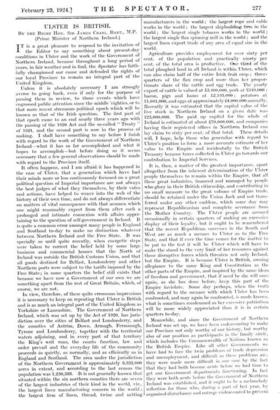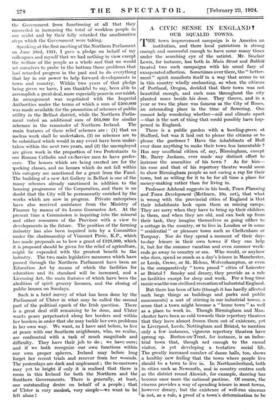ULSTER IS . BRITISH.
BY THE RIGHT LION. SIR JAMES CRAIG, BART., M.P.
. (Prime Minister of Northern 'Ireland.) IT is a great pleasure to respond to the invitation of the Editor to say something about present-day conditions in Ulster and the work of the Government of Northern Ireland, because throughout a long period of years, in fair weather and in foul, the Spectator has faith- fully championed our cause and defended the rights of our loyal Province to remain an integral part of the United Kingdom. .
Unless it is absolutely necessary I am strongly averse to going back, even if only for the purpose of passing them in review, to those events which have engrossed public attention since the middle 'eighties, or to that more recent strenuous political epoch. which will be known as that of the Irish question. The first part of that epoch came to an end nearly three years ago with the passing of the 1920 Act and the so-called " Treaty " of 1921, and the second part is now in the process of making. I shall have something to say before I finish with regard to the work of the Government of Northern Ireland—what it has so far accomplished and what it hopes to accomplish—but before doing so it seems necessary that a few general observations should be made with regard to the Province itself.
It often happens, and I am afraid it has happened in the case of Ulster, that a generation which have had their minds more or less continuously focussed on a great political question of Imperial importance are not always the best judges of what they themselves, by their votes and actions, have helped to weave into the web of the history of their own time, and do not always differentiate on matters of vital consequence with that acumen which one might reasonably expect from them after such a prolonged and intimate connexion with affairs apper- taining to the question of self-government in Ireland. It is quite a common error amongst many people in England and Scotland to-day to make no distinction whatever between Northern Ireland and the Free State. It was specially so until quite recently, when energetic steps were. taken to correct the belief held by some large business and commercial houies that the North of Ireland was outside the British Customs Union, and that all goods destined for Belfast, Londonderry and other Northern ports were subject to the tariffs imposed by the Free State; in some quarters the belief still exists that because we have now a Government of our own we are something apart from the rest of Great Britain, which, of course, we are not.
In view, therefore, of these quite erroneous impressions it is necessary to keep on repeating that Ulster is British and is as much an integral part of the United Kingdom as Yorkshire or Lancashire. The Government of Northern Ireland, which was set up by the Act of 1920, has juris: diction over the cities of Belfast and Londonderry, and the counties of Antrim, Down, Armagh, Fermanagh, Tyrone and Londonderry, together with the territorial waters adjoining, and in every part . of that territory the King's writ runs, the courts function, law and order prevail and the everyday life of the community proceeds as quietly, as normally, and as efficiently as in England and Scotland. The area under the jurisdiction of the Northern Government is approximately 3,352,000 acres in extent, and Recording -to the last census the population-Wag 1,250;533. iIt is not generally known that situated within the six northern counties there are seven of the largest industries of their kind in the world, viz., the largest linen manufacturing concern in the world ; the largest firm of linen, thread, twine and netting manufacturers in the world.; the largest- rope and cable works in the world ; the largest shipbuilding firm in the world ; the largest single tobacco works in the world ; the -largest single flax spinning mill in the world ; and the largest linen export trade of any area of equal size in the world.
Agriculture provides employment for over sixty per cent. of the population and practically ninety per cent. of the total area is productive. One third of the total ploughed land in all Ireland is within Ulster, which can also claim half of the entire Irish fruit crop ; three- quarters of the flax crop and more than her propor- tionate share of the cattle and egg trade. The yearly export of cattle is valued at £5,800,000, pork at V349,000 ; bacon, pigs and hams at L2,195,000 ; potatoes at £1,081,000, and eggs at.approximately £4,000,000 annually. Recently it Was estimated that the capital value of the live stock in Northern Ireland on a given date was £25,000,000. The paid up capital for the whole of Ireland is estimated at about L70,000,000, and companies having their registered offices in Northern Ireland can lay claim to sixty per cent. of that total. These details will, I hope, help those who generalize with regard to Ulster's position to form a more accurate estimate of her value to the Empire and incidentally to the British Treasury because taxes collected in Ulster go towards our contribution to Imperial Services.
It is, then, a matter of the greatest importance, apart altogether from the inherent determination of the Ulster people themselves to remain within the Empire, that all these great industries, financed and managed by people who glory in their British citizenship, and contributing in no small measure to the great volume of Empire trade, should be retained under the Union Jack and not trans- ferred under any other emblem, which some day may represent Republicanism and complete severance from the Mother Country. The Ulster people are accused occasionally in certain quarters of making an excessive display of their loyalty, but it ought to be remembered that the recent Republican successes in the South and West are as much a menace to Ulster as to the Free State, and that if ever the time comes for the matter to be put to the test it will be Ulster which will have to make the stand to the very limit of her resources against those disruptive forces which threaten not only Ireland, but the Empire. It is because Ulster is British, owning allegiance to the same King and Constitution as the other parts of the Empire, and inspired by the same ideas of freedom and government, that if need be she will once again, as she has done before,- keep this part of the Empire inviolate. Some day perhaps, when the truth with regard to the menace with which Ulster has been confronted, and may again be confronted, is made known, what is sometimes condemned as her excessive patriotism will be more widely appreciated than it is in certain quarters to-day.
Meanwhile, and since the Government of Northern Ireland was set up, we have been endeavouring to make our Province not only worthy of our history, but worthy also of our position as participants in the family circle, which includes the Commonwealth of Nations known as the British Empire. Like all other Governments we have had to face the twin problems of trade depression and unemployment, and difficult as these problems are, they were made more difficult in our case by the fact that they had both become acute before we had time to get our Government departments functioning. In fact they were both acute before the Government of Northern Ireland was established, and it ought to be a melancholy reflection for those who, during a part of last year, by organised disturbance and outrage endeavoured to prevent the Government from functioning at all that they succeeded in increasing the total of workless people in our midst and by their folly retarded the ameliorative steps which the Government were taking.
Speaking at the first meeting of the Northern Parliament on June 23rd, 1921, I gave a pledge on behalf of my colleagues and myself that we had nothing in view except the welfare of the people as a whole and that we would set ourselves to probe to the bottom those problems that had retarded progress in the past and to do everything that lay in our power to help forward developments in town and country. Within two years of that pledge being given we have, I am thankful to say, been able to accomplish a great deal, more especially peace in our midst. An arrangement was negotiated with the Imperial Authorities under the terms of which a sum of £500,000 was made available for the promotion of schemes of public utility in the Belfast district, while the Northern Parlia- ment voted an additional sum of £64,000 for similar schemes in the remainder of Northern Ireland. The main features of these relief schemes are : (1) that no useless work shall be undertaken, (2) no schemes are to be subsidized which would in any event have been under- taken within the next two years, and (3) the unemployed are given work in the proportion of two Protestants to one Roman Catholic and ex-Service men to have prefer- ence. The houses which are being erected are for the working classes, and no houses which do not fall within this category are sanctioned for a grant from the Fund. The building of a new Art Gallery in Belfast is one of the many schemes already sanctioned in addition to the housing programme of the Corporation, and there is no doubt that the City will be permanently enriched by the works which are now in progress. Private enterprises have also received assistance from the Ministry of Finance by means of its Loans Guarantee Act. At the present time a Commission is inquiring into the mineral and other resources of the Province with a view to developments in the future. The position of the farming industry has also been inquired into by a Committee under the chairmanship of Viscount Pirrie, K.P., which has made proposals as to how a grant of £128,000, which it is proposed should be given for the relief of agriculture, might be expended with the greatest benefit to the industry. The two main legislative measures which have passed through the Northern Parliament have been an Education Act by means of which the facilities for education and its standard will be increased, and a Licensing Act, the main features of which have been the abolition of spirit grocery licences, and the closing of public houses on Sundays.
Such is a brief Survey of what has been done by the Parliament of Ulster in what may be called the second part of the political epoch of the Irish question. There is a great deal still remaining to be done, and Ulster wants peace perpetuated along her borders and within her borders in order that she may tackle her own problems in her own way. We want, as I have said before, to live at peace with our Southern neighbours, who, we realise, are confronted with a task of much magnitude and difficulty. They have their job to do ; we have ours; and if we both recognize our own functions within our own proper spheres, Ireland may before long forget her recent trials and recover from her wounds. The yesterdays are dark and unpleasant ; the to-morrows may yet be bright if only it is realised that there is room in this Ireland for both the Northern and the Southern Governments. There is generally, at least, one outstanding desire on behalf of a people ; that of Ulster is very modest, very simple—we want to be left alone I











































 Previous page
Previous page